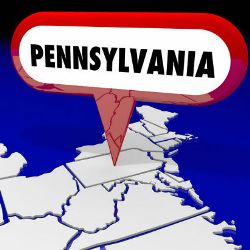Pennsylvania iPoker Market to Initially be Worth $40M a Year

Pennsylvania became only the fourth US state to legalize online gambling last month, and it now stands with Nevada, New Jersey, and Delaware as the country’s only regulated online gambling markets. While the Keystone state is not expected to launch its online gambling industry until sometime next year, iGaming operators are still eager to get started, but must nevertheless stay patient and work with the Pennsylvania Gaming Control Board in order to ensure they comply with all gaming regulations and requirements before starting their operations.
In the meantime, gaming analyst Chris Grove published a report recently showing readers what the Pennsylvania online poker market will look like once launched. Grove bases many of his estimates using comparisons from neighboring New Jersey, which should at least offer iGaming operators interested in Pennsylvania an idea of what to expect. That said, they must also remember that gaming analysts have missed the mark by a wide margin in the past when it comes to estimating potential gambling markets.
Potential Market Size
An important factor that every iGaming operator will seriously be considering is the fact that the population of Pennsylvania is higher than most other US states. In total, there is an estimated 12.8 million residents in Pennsylvania, making it the fifth largest state in the country. In fact, combining the population of Delaware (952k), New Jersey (9m), and Nevada (2.95m) will subsequently gives you a close approximation of the population of Pennsylvania, with the population of Pennsylvania also around 40% higher than that of New Jersey.
Therefore, one way to assess the potential iGaming market of Pennsylvania would be to look at the market in New Jersey and increase the numbers by 40%. Case in point, the New Jersey Division of Gaming released their September 2017 gaming revenue results recently, showing that gross gaming revenues (GGR) for the first three quarters of 2017 reached $20 million for online poker. It’s expected this GGR will reach $25 million for the state by the end of the year, meaning that Pennsylvania could expect a GGR of around $36 million per year after its launch.
However, Grove takes a more optimistic approach on the subject, estimating that online poker GGR in Pennsylvania could reach $41 million during the first full year of operations, increasing to $43 million over the following years. New Jersey brought in $29.8 million for its first full year of operation and while the online gaming market struggled for several years – things improved dramatically in recent times. One relevant factor is that PokerStars, the largest online poker room in the world, found itself unable to enter New Jersey straight away because of licensing issues over being termed a “bad actor”. It wasn’t until 2016 before it could properly gain access to the market, and Grove believes that PokerStars will be able to enter Pennsylvania from the very beginning, which should prove an important factor in boosting initial gaming revenues for the state.
Licensing Fees and Marketing Budget
It’s expected major iGaming players such as 888Poker, PokerStars, and PartyPoker will apply for online gaming licenses in the state, with Grove estimating that Pennsylvania will generate around $120 million from just the licensing fees alone.
Grove also expects that iGaming operators will be more cautious about spending their money on marketing and advertising going forward, because they are now more concerned than ever about about how such expenditure will ultimately impact their budgets and overall bottom lines. That’s because Pennsylvania will set different tax rates on their iGaming industry than New Jersey; which has a flat 17.5% gaming tax. Pennsylvania, on the other hand, will impose a 16% tax on GGR from online table and poker games, and up to a massive 54% taxes on GGR for online slots.
Bear in mind that most of the revenue iGaming operators make comes from online slots. Therefore, this 54% tax rate means that they are likely going to be more cautious about how much spending they do for the first few years until they can properly assess how the market is responding. Finally, Grove feels that Pennsylvania will try to quickly enter the online liquidity sharing agreement with Nevada, New Jersey, and Delaware. Needless to say, doing so would boost liquidity in the Pennsylvania online poker market, and help stabilize the market immediately.







